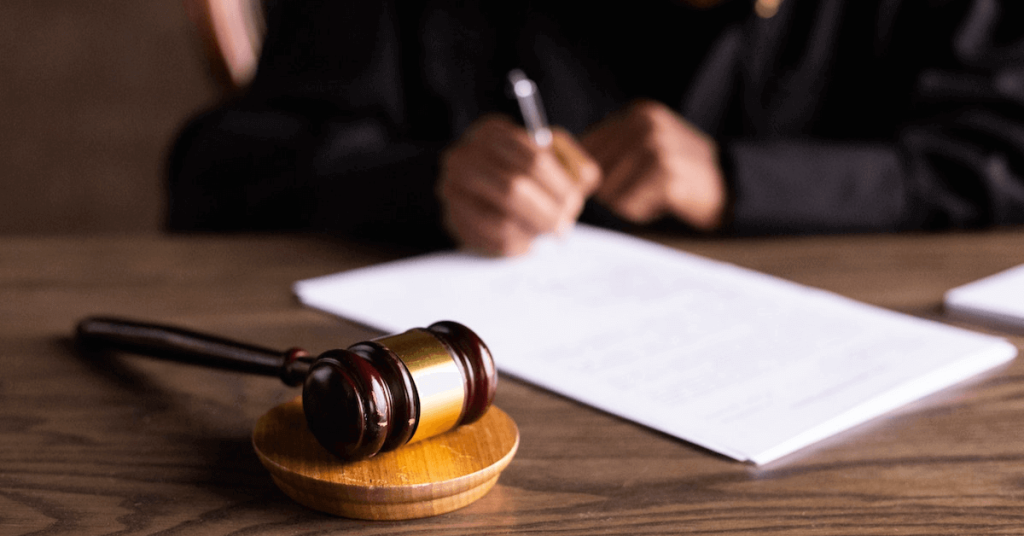Mandatory court attendance for the defendant in an AVO case is specified by Local Court Practice Note 2 of 2012: Domestic and Personal Violence Proceedings.
The defendant’s initial court appearance, known as the mention (first court date), will happen in court, and subsequent court appearances, including hearings and mentions, may be required based on agreements between two parties.
Table of Contents
ToggleAVO Court Hearing Process
The process of obtaining and managing an AVO in court involves several crucial steps designed to ensure the safety of individuals who feel threatened by someone. An AVO court hearing is a pivotal part of this process, where the allegations and evidence are presented to a magistrate for consideration.
In this context, it’s essential to understand the key elements and stages that constitute the AVO court hearing process, which plays a significant role in determining the final outcome and protection measures.
Step 1: First Court Date (the mention)
At the mention, the Court will ask the defendant, and the applicant about preferences, and a magistrate will issue procedural orders to determine how the matter will proceed.
Here are a few things to consider before the mention:
- The lawyer who will represent
- Any variations the defendant want to make to the AVO
- Whether the defendant will accept the AVO without admissions or contest the AVO
Step 2: Evidence and Other Preparations
In the event that the defendant oppose the Apprehended Violence Order (AVO), the Court may direct them to file and serve statements so that the hearing can be prepared.
The case will then be considered for another mention.
After reviewing the defendant and the applicant’s statements, the Court may list the case for a hearing. If the Court is busy, the hearing may be scheduled in a couple of weeks or months.
The Court will need to know the following information when the case is scheduled for hearing:
- In case the defendant or any witnesses need interpreters
- Whether any of the witnesses are children
- In case they are unable to attend Court on a particular date
Step 3: Attending the Hearing
During the hearing, the Court will read any statements that have been filed and consider any evidence presented.
The defendant should prepare for the hearing to tell the Court why there is a disagreement with the application and answer any questions they may ask.
If the AVO is wished to be challenged, the defendant must seek legal representation from an experienced AVO lawyer.
The defendant will need to attend court for the court hearing.
Step 4: The Court Makes a Decision
Depending on the evidence presented and the statements read, the Court will either:
- Make the AVO final, or
- Dismiss the application.
Consented AVO: Court Attendance Requirement
If the defendant consents to the application filed against them, they will need to attend court on the day to confirm their understanding of what they are consenting to.
After this, it is not a requirement for them to attend court for an AVO.
Note that as a defendant, you do not have to plead guilty to any of the allegations in the application to consent to the order. A final AVO is usually made by consent and ‘without admissions’.
Defendant’s Request for Undertaking
Defendants who do not consent to an AVO may consent to an “undertaking” if the protected person agrees to withdraw the AVO application.
In this context, an “undertaking” typically refers to a formal promise or commitment made by the defendant to the court. This undertaking might involve agreeing to specific conditions or restrictions imposed by the court, such as refraining from certain behaviors or activities, without admitting guilt.
The breach of an undertaking is not a criminal offence, unlike an AVO. Breaching an undertaking, however, may lead to a second AVO application against the defendant.
It is recommended that a protected person seek legal advice before agreeing to an undertaking. The availability of undertakings and their terms can vary depending on jurisdiction and the specific circumstances of the case.
Conclusion
Do you have to attend Court for an AVO? Yes, you will need to attend court for an AVO (Apprehended Violence Orders).
The mention (your first court date) will take place in Court.
After that, you may have to attend Court for a hearing and further mentions depending on what you and the applicant agree on.
At Justice Family Lawyers, we understand AVO’s complexity and are committed to providing our clients with the highest quality legal advice and representation.
Our lawyers and practitioners are highly experienced and knowledgeable in family law matters, and we are committed to helping our clients receive the best possible outcome.
Principal of Justice Family Lawyers, Hayder specialises in complex parenting and property family law matters. He is based in Sydney and holds a Bachelor of Law and Bachelor of Communications from UTS.







1 thought on “What Happens at an AVO Court Hearing?”
Pingback: Can The Public Attend Court Hearings (NSW)